Guide to the Best Almond Milk
Written by:
Suzanne Weaver-Goss
01/31/2022
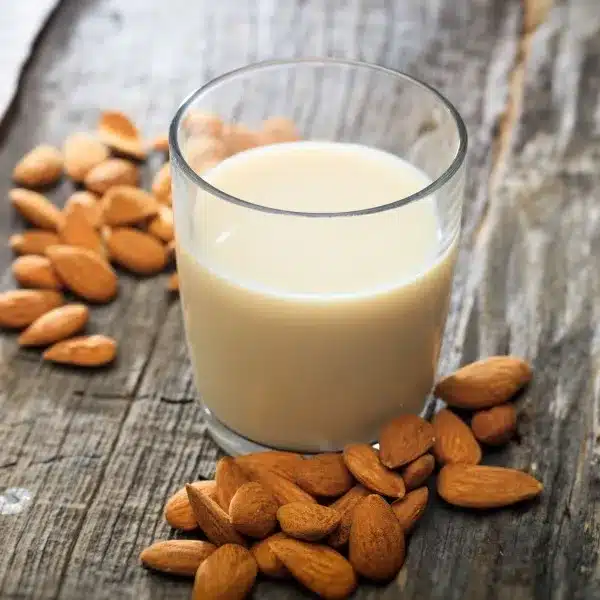
Updated: 01/22/2024
Looking for a different guide? Browse them all HERE.
Best Almond Milk
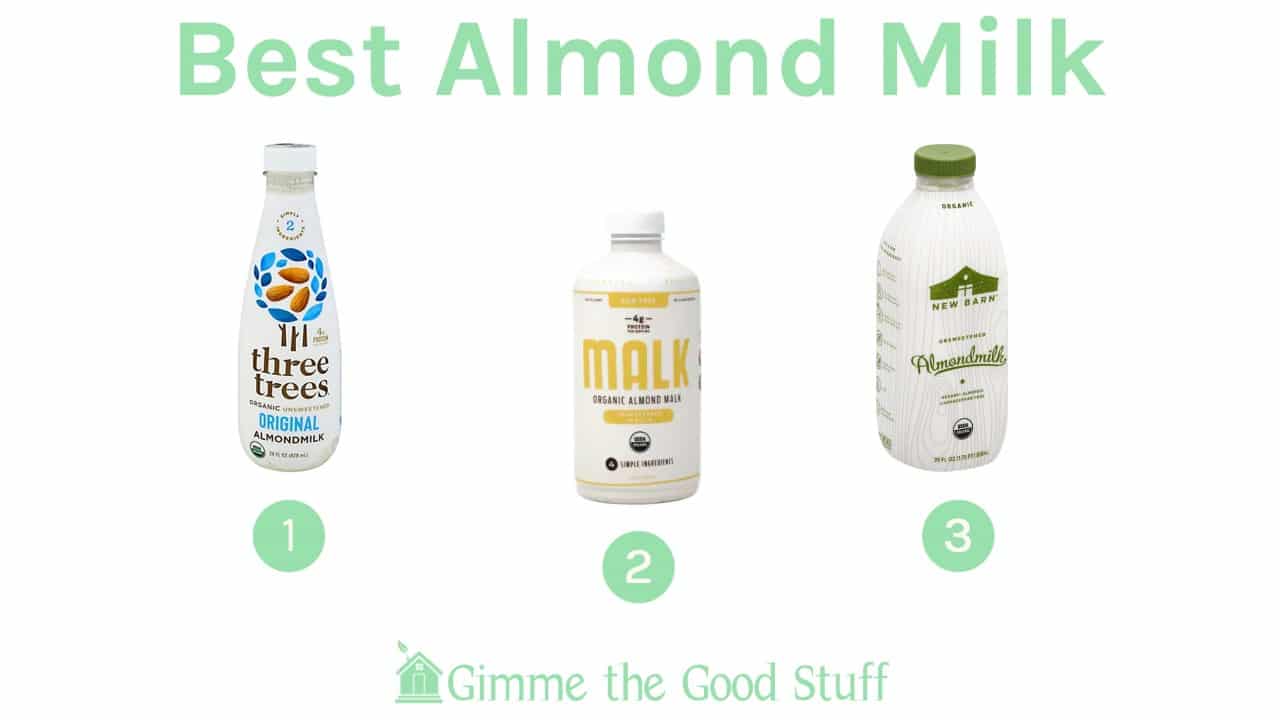
Many of you have requested that we research plant-based milks. Because this category is now so broad, I’m starting with the most popular plant-based milk–almond milk. Market research indicates that almond milk has the greatest share of the alternative-milk market.
If you’re interested in finding the healthiest non-dairy milk, check out our other plant-based milk guide! I’ve covered the best oat milk to drink, including my opinions on which is better between almond and oat milk.
The Benefits of Plant-Based Milks
Lighter footprint: Any plant-based milk has a lighter impact than dairy with greenhouse gas emissions.
Dairy Free : Plant-based milks are a dairy alternative for people with sensitivities to dairy or a vegan diet.
Taste: Some people simply prefer the taste of milk alternatives, and there is something for everyone.
Is Almond Milk More Healthy Than Dairy Milk?
Not necessarily! As you’ll see below, there is a lot of Sneaky Stuff and Bad Stuff among almond milk products on the market. Apart from veganism or dairy sensitivities, people may be better off drinking the best dairy milks (local, organic, and from pasture-raised animals) over poor-quality almond milks.
Almond Milk: Healthy and Unhealthy Ingredients
What is Almond Milk Made of?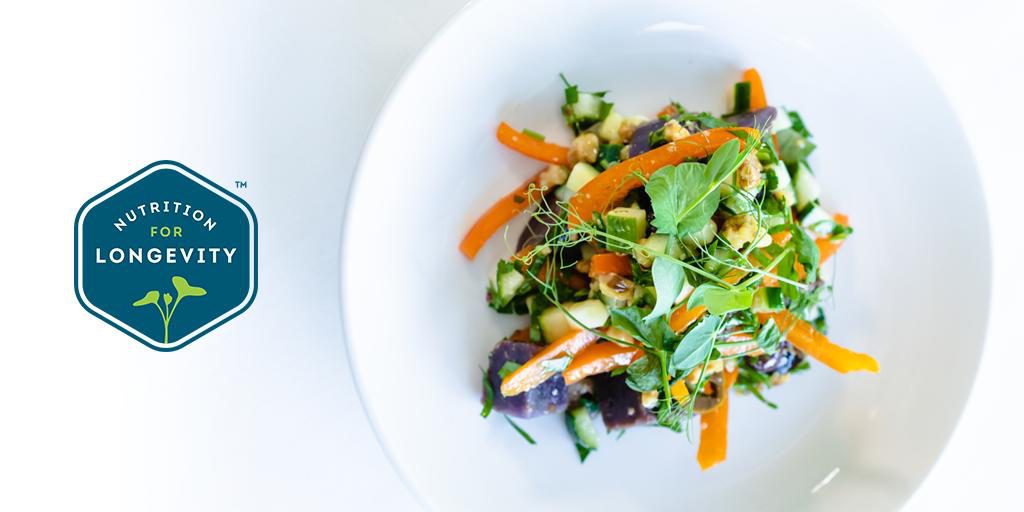
All almond milks include at least almonds and water. Many also have sweeteners, thickening agents, emulsifiers and stabilizers, flavorings, preservatives, added protein, and added vitamins and minerals.
Do I Need to Choose a Fortified Almond Milk?
Some almond milk brands fortify their drinks with calcium and vitamins A, D, and E. This is in order to better mirror the nutritional profile of commercial dairy milk.
You may prefer fortified almond milk if you’re seeking a nutritional replacement for dairy. However, it is possible for children to consume too much of nutrients such as Vitamin A, zinc, and niacin. This is a good thing to bring up with your health provider.
What About Added Sugar in Almond Milk?
Thanks to lactose, cow’s milk is naturally sweet. Some almond milks contain added sugars to mimic the taste profile of cow’s milk.
However, lactose in dairy doesn’t impact blood sugar responses as much as added sugars do. Some sweetened almond milk can have as much as 20 grams of sugar per serving. We do not consider almond milk with added sugar to be Good Stuff.
Why You Should Choose Almond Milk With No Additional Stabilizers and Emulsifiers
Many commercial almond milks have ingredients that act as thickening agents, emulsifiers, stabilizers, flavorings, and preservatives. The most problematic tend to be some of the stabilizers and emulsifiers. They are usually listed as gums, lecithins, and carrageenan.
Some research suggests that these ingredients may cause inflammation, leading to mild discomfort or gas. In the case of carrageenan, symptoms include potential colitis, irritable bowel syndrome (IBS), rheumatoid arthritis, diabetes, and colon cancer. I definitely recommend avoiding carrageenan. If you want to skip all of these questionable ingredients, choose an almond milk from our Good Stuff category.
Almond milk with added thickeners usually contains the fewest almonds. Another hack for discerning the almond content in your milk is to look at the fat, protein, and calorie numbers. The higher those are, the more almonds are likely to be in the milk.
Scary Stuff in Almonds
After a few salmonella outbreaks were traced to California-grown almonds in the early 2000’s, the USDA implemented a rule requiring the pasteurization of California almonds. This rule applies to both conventional and organic almonds. Unfortunately, some of the methods used to pasteurize non-organic almonds involve toxic chemicals. Carcinogenic herbicides like glyphosate also frequently contaminate almonds.
Unfortunately, due to cross-contamination, even organic stuff isn’t necessarily glyphosate free. Therefore, organic almond milk is the only Good Stuff. The Best Stuff is certified glyphosate-residue free by The Detox Project.
Almond Milk’s Controversial Environmental Impact
Almond production is much more environmentally friendly than dairy production. However, growing almonds uses a lot of water. Some estimates suggest that each single almond represents 1.1 gallons of water!
Although this is a lot of water, data suggests that almond production is still better than dairy production. Growing almonds uses significantly less land and freshwater than dairy does. Almond crops produce less than a third of the greenhouse gas emissions of the dairy industry.
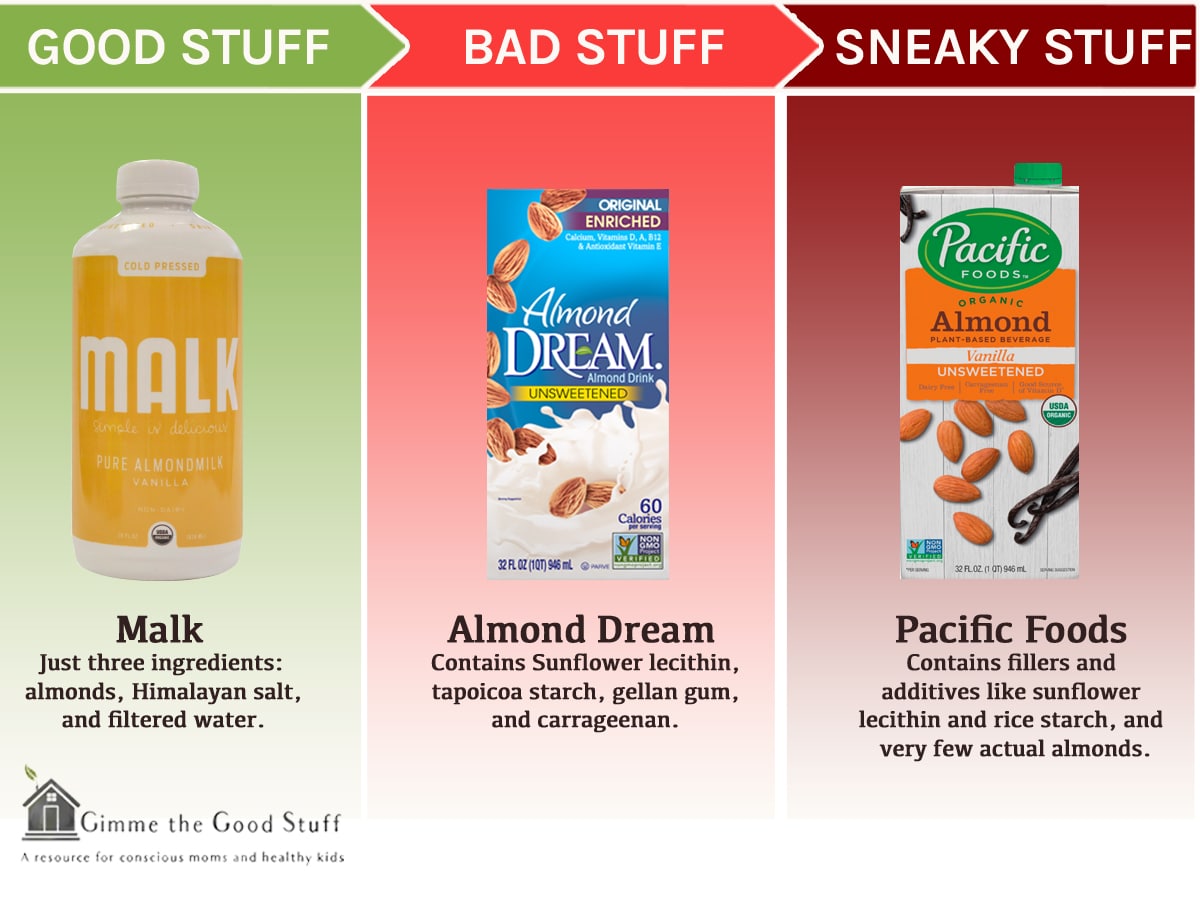
Good Stuff: The Healthiest Almond Milk Brands
Almond milk is Good Stuff if it’s organic, has no added thickeners or stabilizers, and has only a few necessary, familiar ingredients.
Malk Organic Unsweetened Almond Milk
- My personal favorite—the Best Stuff
- Ingredients: filtered water, organic almond butter, Himalayan sea salt (The Vanilla Malk also uses vanilla beans for flavoring)
- Certified glyphosate-residue free by The Detox Project
- $0.37/fl oz
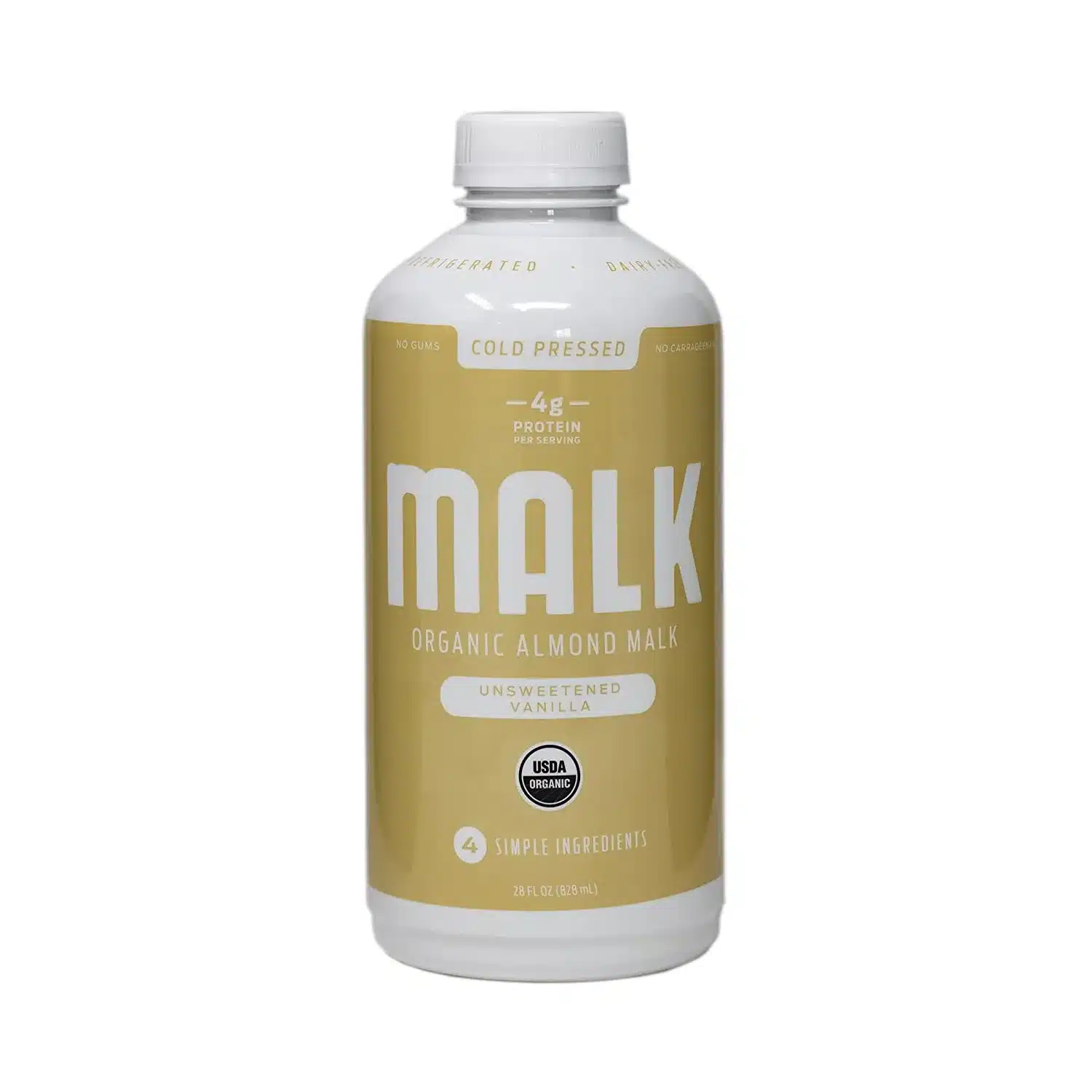
Milli Almond Mylk
- Made from organic nuts and organic coconut sugar
- Ingredients: organic Spanish almonds, organic California almonds, organic tiger nuts, organic almond protein, organic coconut sugar, organic cashews
- $0.39/fl oz
Mooala Organic Simply Almond Milk
- Note: choose the Simple almond milk rather than the Orignal; the Orignal contains gellan gum
- USDA organic certified
- Ingredients: water, organic almonds, salt
- $0.18/fl oz

Three Trees Original Almond Milk
- The Best Stuff; USDA certified organic
- Ingredients: organic almonds, filtered water
- Also available in vanilla, pistachio, and black sesame seed flavors
- $0.24/fl oz
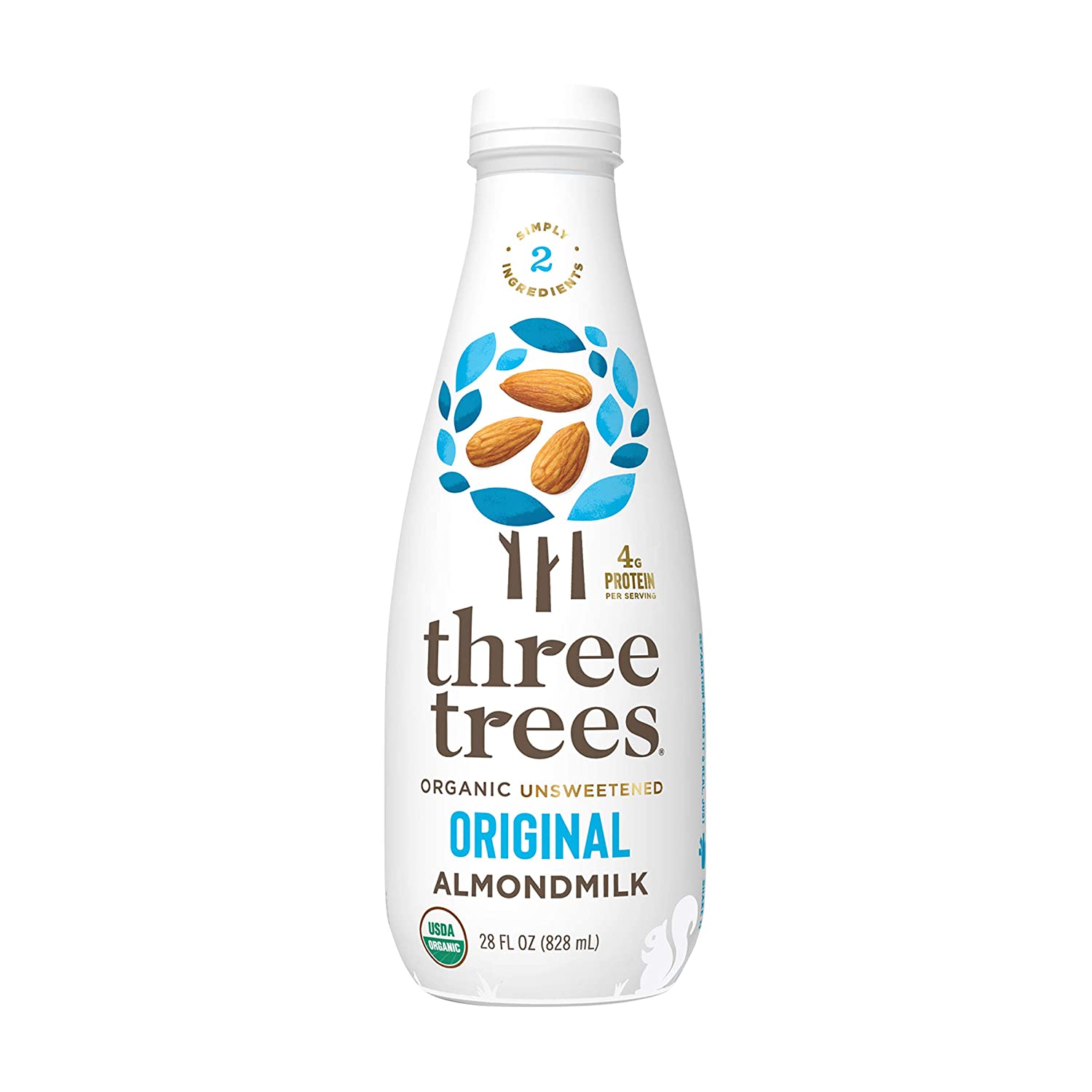
If you’re enjoying this guide, sign up for our Newsletter to be alerted when we publish or update our Safe Product Guides.
Bad Stuff: Unclean Almond Milks
Califia Farms is certified glyphosate-residue free by The Detox Project but
- Not certified organic
- Contains very few almonds
- Ingredients include: sunflower lecithin, gellan and locust bean gums (all potentially problematic)
Almond Breeze Unsweetened (Blue Diamond)
- Not certified organic
- Ingredients include: sunflower lecithin, gellan gum
- Not certified organic
- Ingredients include: sunflower lecithin, tapioca starch, gellan gum, carrageenan
- Not certified organic
- Contains fewer almonds and more fillers than “Good Stuff” almond milks
- Ingredients include: sunflower lecithin, gellan and locust bean gums
Friendly Farms Almond Milk by Aldi
- Not certified organic
- Contains few almonds and more fillers and additives
- Ingredients include: sunflower lecithin, gellan gum, vitamin A palmitate, vitamin DR and D-alphatocopherol
Sneaky Stuff
Silk Unsweetened Vanilla almond milk
- Only contains a few almonds per cup
- Fortified with an added vitamin and mineral blend
- Contains added “natural” flavor
Kirkland Organic Unsweetened Almond Milk
- May have as few as only 5 almonds per cup
- Contains added vitamins and thickeners
Orgain Organic Unsweetened Almond Milk is popular because it’s USDA certified organic and contains added calcium but
- Contains many thickeners and emulsifiers
- Contains protein, a sign that it may contain few almonds per cup
Pacific Organic Almond Milk is certified organic but
- Contains few almonds and more fillers and additives
- Ingredients include: sunflower lecithin, rice starch
Trader Joe’s Organic Unsweetened Almond Beverage is USDA certified organic but
- Contains many fillers like gellan and locust bean gum
- Is fortified with vitamins
Homemade Almond Milk Recipe
For the healthiest, most transparent, best almond milk, make it yourself! Although you have to soak the almonds overnight, the milk comes together very quickly. See our favorite recipe here. We’ve also recently become obsessed with the Nutr Machine for the easiest possible way to make plant milk.
Read more about our choices for the safest products for your family here.
Be well,


Suzanne, Certified Holistic Health Coach
Note: This article contains affiliate links or sponsored content, which means that if you make a purchase, we may earn a commission. We only recommend products that meet our strict standards for non-toxicity and that we use (or want to use!) ourselves. Thank you so much for supporting the brands that make Good Stuff!
Enjoying this guide?
Join 60K families who rely on our free guides on everything from milk to mattresses! Sign up to get $5 off your first order, access to our ultimate Clean Products Cheat Sheet, and ongoing exclusive access to coupon codes and promotions. Our weekly newsletter is filled with well researched tips and tricks to live a toxin-free lifestyle.
Related Posts
Healthy Store Bought Oat Milk Guide 2024
42 Ways to Have a Healthy 2024
What to Do in Dry January: An Idea for Every Day of the Month
How To Avoid Drinking Toxic Tea
15 responses to “Guide to the Best Almond Milk”
-
What about the Simply brand?
-
Thanks for the information! Really disappointing that all the good brands are in plastic containers!
-
I appreciate all the great suggestions but almond milk production is so damaging to our environment, not just for the significant amount of water needed to grow the almonds, but also the amount of greenhouse gas emissions it produces and contributions to droughts. Almond crops even impact bees. As a site promoting health for families, I think you should also promote health for our planet. It is irresponsible of you to publish this guide without pointing these issues out. Personally, I drink Malk oat milk which is the least damaging to the environment.
-
The Malk brandished formula does contain natural flavors. I just get their unsweetened version which only has three ingredients. I’ve also been trying to to make my own with Almond butter which is really easy.
-
Great Sheri! I like making my own almond milk.
-
Update here:
Malk removed the natural flavor from their vanilla blend.
-
-
Thanks for this guide! It was very enlightening. I’m just confused as to why Elmhurst Dairy is in your “Sneaky Stuff” list. It’s not organic, but doesn’t claim to be, and it sounds like the absence of fillers makes it much more desirable than others on the list. I’m now ot seeing what would be particularly deceptive about them. No additives, and certified glyphosate-residue free by The Detox Project sounds pretty good compared to the rest of the field!
Maybe it qualifies as OK stuff?? In any case, based on the info, I’m going to choose it over some other options on the “Bad Stuff” and “Sneaky Stuff” lists when the Good Stuff is not available. I had been reluctantly avoiding them in favor of organic products, but seems like that’s not always better depending on additives.
I have a soft spot for Elmhurst Dairy, (being a vegan and former NYer) because they were a long-established traditional dairy, making animal products, and made the move to switch their whole operation over to plant milks. I appreciate their boldness and wish there were more out there like them.
Also, wondering where Whole Foods organic almond milks would rank. That’s my current go-to.
Thanks for covering this topic!
-
I’m *not*seeing what would be…deceptive.
-
Lauie, Yes, I struggled with this too because I was buying Elmhurst and didn’t notice right away that they weren’t using organic almonds! Perhaps, I felt deceived.I was surprised because it was so healthy otherwise. Once I did the research on almonds and how many toxins were in the ones that weren’t organic I felt I had no choice. But I think you make some good points and maybe it is Ok?
-
-
Thank you for this! My go to brands have been Blue Diamond and Kirkland. Looks like I need to update my shopping list this weekend….
What do you think about Trader Joe’s unsweetened almond milk?-
Hi Bella,
Like many of the other almond milks that I researched Trader Joe’s has a lot of fillers and therefore I think it probably has fewer actual almonds.
Suzanne
-
-
Thanks for this! What do u think of orgain almond milk? I am needing the extra calcium. Thank u!
-
Hi Shoni,
I hadn’t heard of this brand. I did a quick look. It is organic which is good, but they do add a few gums for thickening and emulsifiers which always makes me question how many almonds it has in it. And then I see they add pea protein to give it protein because they probably don’t have very many almonds in it. So as far as protein it’s good if you want pea protein. I wonder why it has to have so many other ingredients. I wonder why it has so much calcium and why? I will have to look into this more. I probably wouldn’t recommend it because of all the fillers.
-
-
Thank you for this! I’m pretty new to almond milk, but I really thought my go-to brand was ‘good stuff.’ It turns out it’s not at all. I went out and bought Malk after reading this, and I like the taste so much more than that other brand.
-
Hi Vanessa,
That’s great! Glad you are enjoying Malk, I like that one a lot.
Suzanne
-

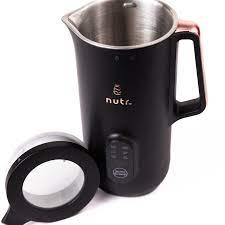
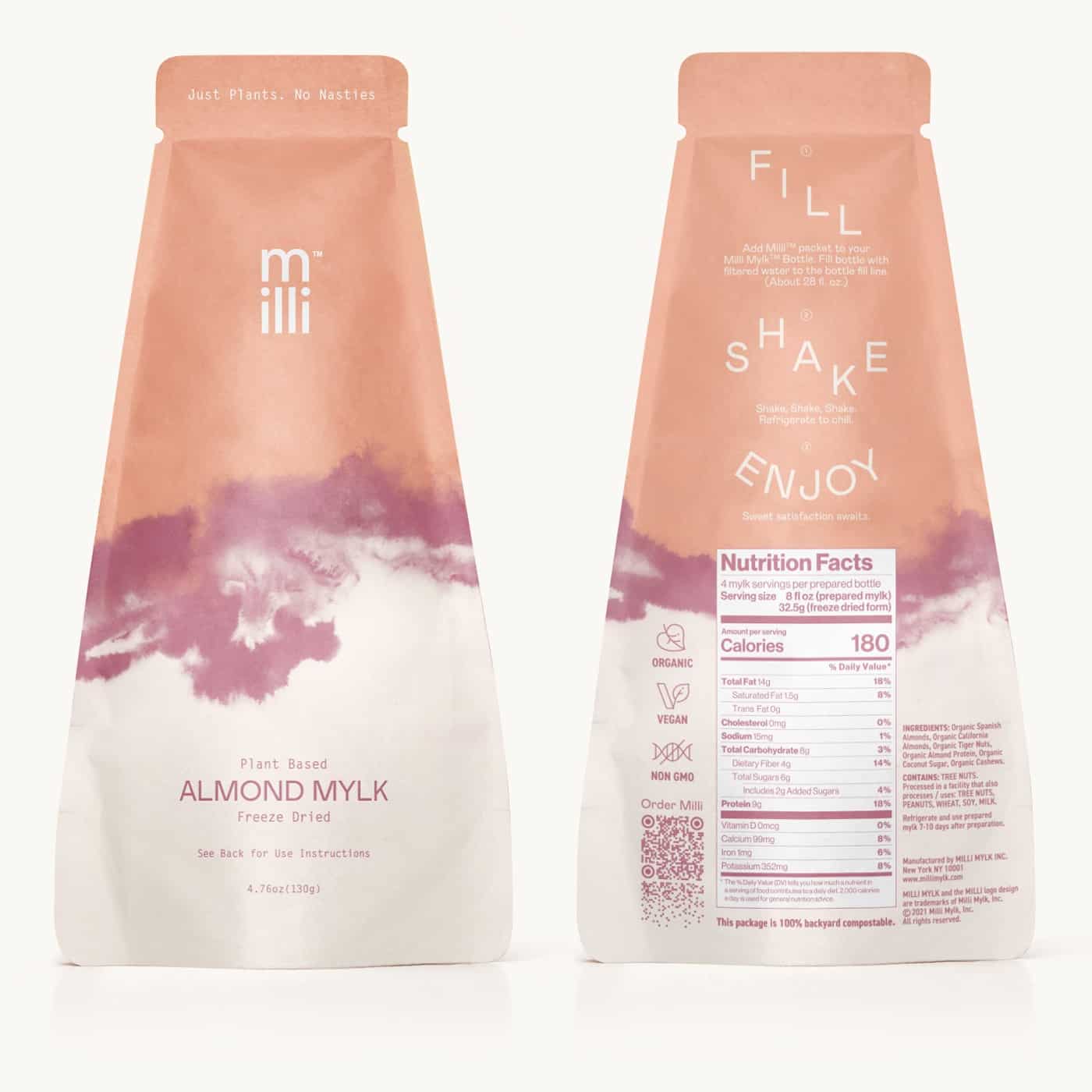
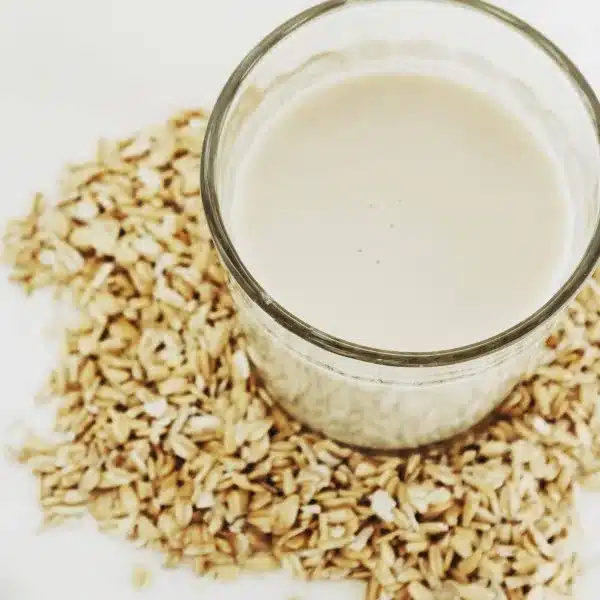



Leave a Reply
You must be logged in to post a comment.